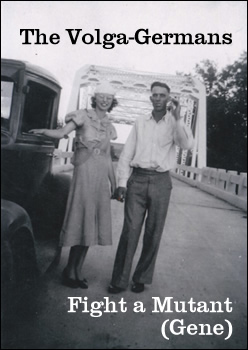The Volga-Germans Fight a Mutant (Gene)

Historical essay delivered to the American Historical Society of Germans from Russia, Lincoln, NE, July 2014 In 1878, Jacob Reiswig, his wife Anna, and their four sons, arrived in Marion County, Kansas, from Walter, Russia. Some of their descendants carry an autosomal dominant gene mutation that causes early onset Alzheimer’s disease. The mutation, named Presenilin 2, was identified in 1995 by a research team led by Dr. Thomas Bird and Dr. Gerard Schellenberg at the University of Washington in Seattle. PS2 is one of three known genes in the world that causes the genetic (familial) form of early onset or young age Alzheimer’s. This type of Alzheimer’s accounts for less than two percent of the total number of Alzheimer’s cases in the world. Some sources say the number is even less. Genetic or familial Alzheimer’s is rare, and the faulty gene in my family is by far the rarest of the three mutations, affecting fewer than two hundred known individuals. It has been called in scientific literature, “The Volga German Gene,” because the people known to carry it are Germans who emigrated to North America from west of the Volga River in Russia. Our mutation, as are the two others that cause early onset Alzheimer’s, is an autosomal dominant gene with complete penetrance. That means each child of a parent who carries the gene has a fifty-fifty chance to inherit the mutation, and each individual who has the mutation has nearly a hundred percent chance of developing symptoms of dementia before age sixty-five, the commonly used age to separate early onset from later onset Alzheimer’s. In my family the average age of onset, as measured by one of the early studies, is fifty-one years of age, but symptoms often appear in the mid-forties.